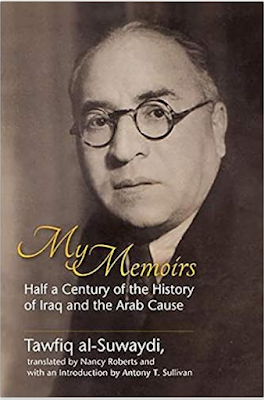Al-Suwaydi, Tawfiq, My Memoirs, Half a Century of the History of Iraq and the Arab Cause, Boulder, London: Lynne Rienner Publishers, 2013
Tawfiq al-Suwaidi was one of Iraq’s first politicians agitating for Iraqi independence during the Ottoman period and then serving in the government under the British and monarchy. He was prime minister three times and advisor and foreign minister under other administrations. My Memoirs, Half a Century of the History of Iraq and the Arab Cause was his autobiography. Its main themes were the belief in British hegemony over Iraq, pan-Arabism, opposition to militarism, Communism, and Zionism, and how a small group of politicians ran the country. His book is important because it explains the views of the Iraqi elite who formed the country.
When Iraq was created by the British in 1920 its leadership consisted of a small group of individuals who surrounded King Faisal. Suwaidi was part of this elite coming from a rich land owning family from Ottoman times who was educated in Turkey and France. Again and again he wrote about the same individuals coming in and out of office. Suwaidi for instance was prime minister three times and served as foreign minister more times than that. Nuri al-Said was a favorite of the monarchy and was premier nine times. Jamil al-Midfai was prime minister five times and Abd al-Sadoun four times. Like Suwaidi they would also hold other positions in various cabinets. Few of their administrations lasted more than a couple months because there were deep rivalries amongst the elite and they would constantly bicker and try to bring each other down. This was not based upon political differences as much as personal ones as people did not like each other and vied for power. In fact the only thing making one government distinct from another was whether they would suppress the public and media. Nuri al-Said for instance would constantly go after the opposition, ban political parties, call out the police, etc. Suwaidi believed in basic political rights. Suwaidi paints a picture of a new country whose politicians were most concerned with administering the state and subverting their enemies rather than ideology. Little has changed as today’s Iraqi politicians are almost exactly the same. They like Suwaidi’s generation have no real vision for the nation. They just want power and to deny it to others.
The one political idea that was prevalent in Iraq under the monarchy was pan-Arabism. Suwaidi was introduced to Arab nationalism when he was in college during the Ottoman era. This was one of his main passions as he often served as foreign minister and pushed for Palestinian independence from the British and freedom for Syria from the French. This was ironic because he supported the British Mandate over Iraq and continued hegemony after Iraq became its own country. He therefore came out for the various Anglo-Iraq Treaties that would ensure London’s influence over Iraq’s foreign policy and military. This was a common view held amongst the politicians who were close to the monarchy. Because they were all put in power by the English who also guaranteed they would remain there they made a compromise with their beliefs. They thought that partnering with the UK was the only way to ensure they ruled while they talked about independence for others.
Suwaidi’s last main point was his opposition to militarism, Communism and Zionism. In 1936 Iraq had the first coup in the modern Middle East. Afterwards the army believed it should run the country and became a center of politics. Suwaidi thought the military should be under civilian control and that the officers had no idea how to run things. The Iraqi Communist Party was the largest political organization in the nation and became the main opposition. Suwaidi wrote that the Communists were against the rich while not helping the poor. He therefore saw the Communists as the main threat to the monarchy and the elite. He even backed some repressive measures to put down Communist led protests. It was his way of dismissing the growing demand for democracy and reform in the country. The elections for instance were fixed and included indirect voting. While Suwaidi said he wanted more democratic reforms he wanted people like himself to exercise those rights and control the process not the masses who increasingly came out into the streets in the 1950s against the system. Finally he believed that Zionists were conspiring against Iraq. He blamed some of the demonstrations on a Communist-Zionist conspiracy which did not exist. That was because most of Iraq’s Jews were largely against Zionism. Suwaidi’s hostility to the military’s interference in the government was about the only thing that set him apart from his contemporaries who were often willing to work with the officer corps if it meant they would get positions.
My Memoirs, Half a Century of the History of Iraq and the Arab Cause is a good book to read to understand the political class under the monarchy. They were a homogenous group largely coming from the same background and holding the same beliefs. Because Suwaidi was involved in politics for so long he covered all the major events under the British Mandate and monarchy. The major drawback is that the book is so detailed. He went on many trips as foreign minister for instance and includes every stop he made, who he met, how they traveled, etc. It makes for an inconsistent read as some parts are far more interesting than others. Still if you want a sense of how Iraq was run when it was first created from the perspective of the country’s leadership this would be a good book to try.
Link to all of Musings On Iraq’s book reviews listed by topic





No comments:
Post a Comment